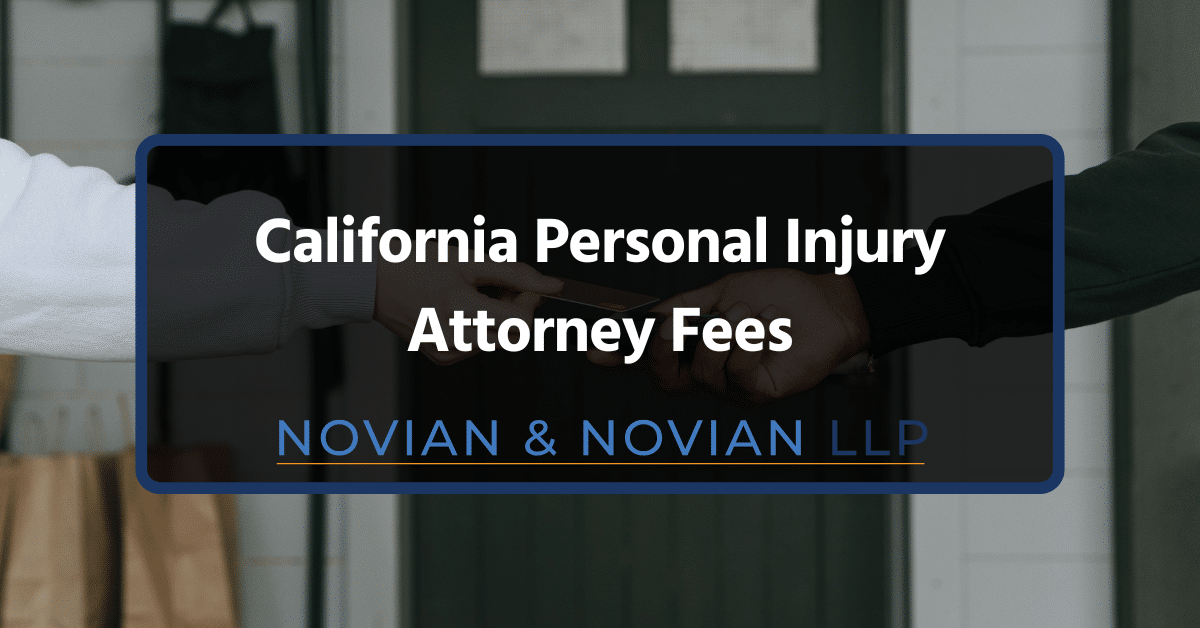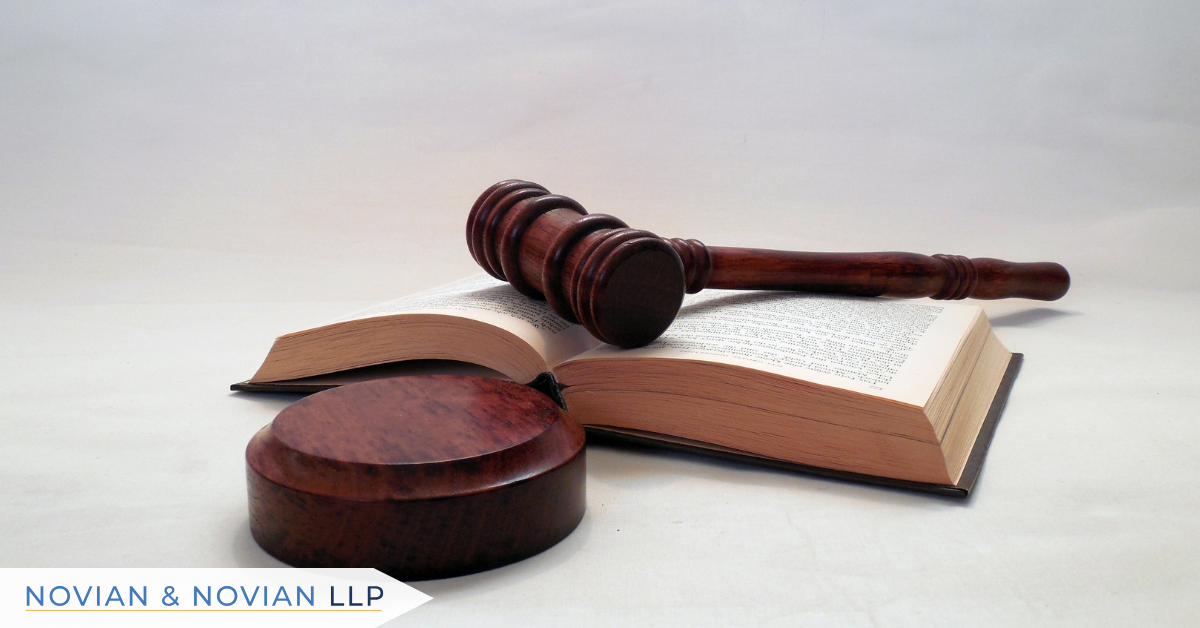Generally, most personal injury attorneys in California work on a contingency fee basis. This means you don’t pay any upfront legal fees, and your lawyer only gets paid if you win your case. Typically, the fee ranges from 33% to 40% of the final settlement or verdict. The percentage may vary depending on the complexity of your case, whether it goes to trial, and the stage at which it is resolved.
At Novian & Novian, we specialize in catastrophic injury cases and are committed to helping victims recover physically, emotionally, and financially. With no upfront fees and over of 35 years experience, our catastrophic injury lawyers are here to protect your rights every step of the way. Schedule a free consultation with us today!
This blog gives a quick overview of personal injury law in California and a breakdown of typical attorney fee structures, and how they are calculated.
Table Of Contents
- How California Regulates Personal Injury Attorney Fees
- What Are a Personal Injury Lawyer’s Fees in California?
- How Lawyer Fees Vary by Case Type in California
- How Are Attorney Fees Calculated in California Personal Injury Cases?
- Who Pays for Personal Injury Lawyer Fees?
- How Can I Find a Personal Injury Lawyer in California?
- Want the Best California Personal Injury Lawyer on Your Side?
- FAQs About Personal Injury Attorney Fees in California
- What Are the Benefits of Contingency Fee Arrangements?
- Can the Court Make the Other Party Pay My Attorneys’ Fees?
- How Much Does a California Personal Injury Attorney Typically Charge?
- Can I Change My Attorney if I Disagree With Their Fees?
- Do Attorney Fees Affect My Final Personal Injury Settlement Amount?
- What if My Case Settles Quickly?
How California Regulates Personal Injury Attorney Fees
California closely regulates personal injury attorney fees to protect clients and ensure transparency. The California State Bar’s Rule 1.5 outlines what attorneys can charge and how those fees must be disclosed. These rules are especially important in contingency fee arrangements, where the attorney’s payment depends on the outcome of your case.
Under Rule 1.5 of the California Rules of Professional Conduct, attorneys are prohibited from charging “unconscionable” or excessive fees. In personal injury cases, this typically means the fee must be reasonable and clearly explained. Most attorneys charge a contingency fee between 33% and 40% of the recovery, depending on whether the case is settled or goes to trial.
California law requires that all contingency fee agreements be in writing and signed by both the attorney and client. This written contract must clearly outline the percentage the attorney will receive, explain how litigation costs and expenses will be handled, and notify the client that fees are negotiable.
You are not required to accept the first fee agreement you receive. As a client, you have the right to ask questions, negotiate terms, and seek clarification before signing anything. A reputable attorney will welcome your questions and will ensure you fully understand the financial arrangement.
What Are a Personal Injury Lawyer’s Fees in California?
When you’ve suffered an injury due to someone else’s negligence, hiring a personal injury attorney can significantly impact your ability to obtain a fair settlement. However, before signing a retainer agreement, you need to understand how personal injury lawyer fees work in California to make informed decisions. California personal injury attorney fees can vary based on the type of fee arrangement your lawyer uses, the complexity of your case, and whether the matter goes to trial or settles early.
Personal Injury Lawyer’s Contingency Fees in California
Most personal injury attorneys in California work on a contingency fee basis, which means you do not owe attorney fees unless you win your case. A contingency fee arrangement allows accident victims to access legal services without paying any upfront costs. The contingency fee percentage is usually based on a portion of the final settlement amount or jury award.
The average contingency fee in California typically ranges from 33% to 40%, depending on the complexity of the case, whether expert witness fees or extensive trial preparation are needed, and how long it takes to resolve the personal injury claim. This means your personal injury lawyer only gets paid if they successfully recover compensation on your behalf. If your case is not successful, you generally do not owe legal fees, although you may still be responsible for some filing fees or court costs depending on your contingency fee agreement structure.
What’s included in a contingency fee is comprehensive legal representation throughout the legal process. This includes initial legal advice, case investigation, evidence gathering, drafting and filing court documents, negotiations with insurance companies, and preparing for trial if necessary. The lawyer also manages communication with third parties and handles any legal complexities, including hiring expert witnesses when required.
Hourly Rates for Personal Injury Attorneys in California
While most personal injury attorneys work on a contingency fee basis, some may charge an hourly fee in specific circumstances. This fee structure is less common in typical personal injury cases, but may apply in complex litigation matters, such as high-stakes medical malpractice cases or when defending against a personal injury lawsuit. In California, hourly rates for legal services can range from $200 to $500 per hour or more, depending on the attorney’s experience and the geographic location of the law firm.
As a client, you should be cautious when entering into an hourly fee agreement, as legal fees can accumulate quickly. Unlike contingency arrangements, hourly billing requires clients to pay for the lawyer’s time regardless of whether the case is won or lost. You may also be responsible for additional costs such as expert witness fees, retainer fees, and other expenses associated with pursuing your legal claim.
Flat Fees Charged by Personal Injury Attorneys in California
Charging a flat fee is rare in personal injury cases, as these matters often involve unpredictable outcomes and varying levels of complexity. However, some attorneys may offer flat fees for very specific legal services within a personal injury case, such as writing a demand letter or providing a second opinion.
A flat fee arrangement may benefit clients seeking clarity and predictability in legal costs, especially if the matter is straightforward. On the other hand, this structure could be disadvantageous in situations where the case becomes more complicated than expected. Since most personal injury lawsuits are inherently uncertain, flat fees are generally not the preferred choice for California personal injury lawyers or clients dealing with serious injuries and mounting medical bills.
How Lawyer Fees Vary by Case Type in California
While most personal injury attorneys in California charge clients on a contingency fee basis, the exact percentage can vary depending on the type of case and its complexity. In general, contingency fee agreements in California fall within the 33% to 40% range of the final settlement or judgment. This structure is standard across most personal injury cases, including car accidents, slip and fall incidents, medical malpractice, and wrongful death claims.
The variation in contingency fee percentage is not usually based on the category of the case alone but rather on factors like how difficult the case is to prove, how long it takes to resolve, and the financial risk the personal injury lawyer assumes. For instance, a relatively straightforward case that settles quickly such as a minor auto accident may be charged at the lower end of the scale, around 33%. However, if your case involves complex litigation, expert witness fees, multiple parties, or goes to trial, your injury attorney might charge closer to 40% to account for the additional time, effort, and risk involved.
Cases involving medical malpractice and wrongful death are often the most intricate due to the need for extensive investigation, expert testimony, and navigating California’s strict legal requirements. As a result, these types of cases typically fall at the higher end of the contingency fee percentage range. This is because the attorney invests significant time and resources into pursuing justice for the client, with no guarantee of recovery unless they win the case.
Regardless of the case type, your personal injury attorney will usually cover upfront costs such as filing fees, court costs, and expert witness fees, which are later deducted from the final settlement amount. This helps accident victims, especially those dealing with mounting medical bills, access quality legal representation without immediate financial strain.
How Are Attorney Fees Calculated in California Personal Injury Cases?
In contingency fee arrangements, attorneys most commonly calculate their fees based on either the gross settlement amount or the net recovery after expenses. The average contingency fee in personal injury cases typically ranges from 33% to 40%, depending on the complexity of the case and whether it settles early or proceeds to trial.
If your personal injury lawyer calculates fees from the gross settlement, their fee is taken from the total amount before any legal costs, filing fees, or expert witness fees are deducted. However, in some fee agreements, the attorney’s percentage is taken from the net recovery, meaning after court costs, medical records, police reports, and other expenses are subtracted. This contingency fee agreement structure can make a meaningful difference in your final payout.
For example, if your final settlement is $100,000 and your attorney fee is 33% of the gross amount, the lawyer receives $33,000. If your legal expenses, such as filing fees, investigator costs, and expert witness fees, total $5,000, those costs would then be deducted from your remaining $67,000. Thus, leaving you with $62,000.
Alternatively, if the attorney fee is calculated from the net recovery instead, the $5,000 in expenses would first be deducted from the $100,000 settlement, leaving $95,000. Then, 33% of that amount, which is $31,350, would be paid to your attorney, and you would retain a slightly higher amount of $63,650.
What Expenses Must You Pay Besides Personal Injury Fees?
In addition to attorney fees, accident victims should be aware of other expenses associated with pursuing a personal injury claim. While your injury attorney typically fronts the initial costs, these are usually reimbursed from your final settlement. These include medical records and police report retrievals, which are often necessary to support your claim.
Further legal services may require payment for expert witnesses, private investigators, court filing fees, and other witness fees depending on the complexity of the case. Though your lawyer pays these costs upfront, you may owe attorney fees and also need to reimburse these expenses after your case concludes, all of which should be outlined in your retainer agreement
Who Pays for Personal Injury Lawyer Fees?
Typically, the attorney’s fees are taken directly from your final settlement amount or jury award, based on a previously agreed contingency fee percentage, usually between 33% and 40%. This fee structure is standard in contingency fee agreements across California and helps reduce financial risk for clients dealing with mounting medical bills and loss of income.
If your case is unsuccessful, many California personal injury attorneys operate under a “no-win, no-fee” policy, meaning you may not owe attorney fees at all. However, there are still certain legal costs such as filing fees, court costs, witness fees, or expert witness fees that you might have to reimburse the attorney for, depending on the retainer agreement and how fee arrangements were structured. While rare, there are some circumstances in which the court may order the party at fault (the defendant) to pay your legal fees, but this is not typical in most personal injury lawsuits.
What Happens When You Change Your Personal Injury Lawyer?
If you decide to switch attorneys in the middle of your personal injury claim, it is necessary to understand how the fees of the lawyer will be handled. Even though most personal injury lawyers charge on a contingency fee basis, your former attorney may be entitled to a portion of the final settlement for the work they performed up until the point of termination. These are called proportionate fees and are typically resolved between the outgoing and incoming attorneys as part of the overall contingency fee agreement structure.
When you hire a personal injury attorney to take over your case, the new law firm will review your existing fee agreement, case documents, and any legal process already in motion. Keep in mind that changing attorneys may delay the progress of your personal injury lawsuit, especially if complex issues like medical malpractice or insurance company negotiations are involved. To make the transition smoother, you must formally notify your current lawyer in writing and confirm how legal fees, retainer fees, and other expenses will be managed.
Before making the change, it is wise to review your financial obligations, including any initial costs paid on your behalf. Be sure to work with California personal injury lawyers who understand the nuances of fee agreements and who will prioritize your interests while helping you secure a fair settlement.
Can You Negotiate Personal Injury Lawyer Fees in California?
In California, it is often possible to negotiate personal injury lawyer fees, particularly in cases where the legal process appears straightforward or the potential for a large final settlement amount is high. While the average contingency fee falls between 33% and 40%, the exact percentage is not fixed by law and may be adjusted based on the complexity of the case, expected litigation costs, or even a sliding scale fee arrangement.
Some personal injury attorneys work on hourly fee or flat fee models in very specific situations, though these are much less common. If you encounter such a fee structure, you can also try to negotiate the rate based on the scope of legal services required. Regardless of the arrangement, it is essential to be clear about what’s included in the fees and what constitutes additional costs.
Furthermore, make sure all negotiated terms are documented in a written retainer agreement to avoid future misunderstandings. Most reputable California personal injury attorneys will be open to discussing fee arrangements and explaining your responsibilities, especially during the initial consultation, which is often free.
How Can I Find a Personal Injury Lawyer in California?
One of the most trusted ways to begin your search is by asking for referrals from friends, family members, or even other attorneys who may know a qualified personal injury attorney. Recommendations from people you trust can help you find professionals with proven track records.
You should also conduct your own research using online lawyer directories, client reviews, and visiting the California State Bar website. There, you can verify that a lawyer is licensed, in good standing, and free from recent disciplinary actions.
Furthermore, be sure to look for California personal injury lawyers with specific experience handling cases like yours, whether it involves car accidents, medical malpractice cases, wrongful death claims, or slip and fall injuries. An attorney who regularly works on personal injury claims will be familiar with the legal strategies, fee agreements, and insurance companies’ tactics that impact the outcome of personal injury lawsuits in California.
It is also important to schedule consultations to compare your options. Most law firms offer a free initial consultation, allowing you to discuss your case, ask about their approach, and review their contingency fee agreement structure. During these meetings, be sure to ask the right questions.
What to Watch for in a Contingency Fee Agreement
When reviewing fee structures, pay close attention to how the attorney fees are calculated. Ask whether the contingency fee is based on the gross settlement amount or the net recovery, and clarify how filing fees, court costs, witness fees, and expert witness fees are handled. Also, understand your obligations regarding upfront costs and whether you may owe attorney fees if you decide to change lawyers or terminate the agreement early.
Some contingency fee agreements contain hidden fees or vague terms about cost reimbursement, so it is essential to read everything carefully. Look out for clauses involving administrative charges, retainer fees, or charges tied to early termination of services. Being informed about your financial responsibilities from the start can help you avoid unpleasant surprises later.
Want the Best California Personal Injury Lawyer on Your Side?
Choosing the right personal injury attorney in California can make all the difference in recovering the compensation you deserve. As we have covered, most personal injury lawyers charge a contingency fee, typically between 33% and 40% of your final settlement amount. These contingency fee arrangements allow accident victims to access experienced legal representation without paying upfront costs.
But before hiring a lawyer, it is essential to understand the fee structure, ask the right questions, and get all terms clearly outlined in a written fee agreement. Ask about their experience with personal injury cases like yours, how fees are calculated (gross vs. net recovery), and what additional costs you may be responsible for. A reputable attorney will offer clarity, transparency, and compassion throughout the legal process.
At Novian & Novian, we’re proud to be recognized among the Best Personal Injury Attorneys in California. Our team is dedicated to delivering results through strategic advocacy, client-focused service, and ethical contingency fee agreements that protect your best interests. Schedule a free consultation with us today!
FAQs About Personal Injury Attorney Fees in California
Below are some questions people have about personal injury fees:
What Are the Benefits of Contingency Fee Arrangements?
Contingency fee arrangements allow you to hire a personal injury attorney without paying upfront costs, as the lawyer only gets paid if you win your case. This reduces financial risk and makes legal representation accessible to accident victims.
Can the Court Make the Other Party Pay My Attorneys’ Fees?
In most California personal injury cases, each party pays their own attorney fees. However, in rare situations, usually involving bad faith or specific legal statutes, the court may order the losing party to cover your legal fees.
How Much Does a California Personal Injury Attorney Typically Charge?
Most personal injury lawyers in California charge between 33% and 40% of the final settlement or jury award. The exact percentage depends on the complexity of the case and whether it goes to trial.
Can I Change My Attorney if I Disagree With Their Fees?
Yes, you can change attorneys at any time. However, you may still owe the original lawyer for work already performed under your signed fee agreement. The new lawyer will often coordinate fee sharing with the previous one.
Do Attorney Fees Affect My Final Personal Injury Settlement Amount?
Yes, attorney fees are typically deducted from your settlement or award, meaning your final payout will be reduced by the agreed contingency fee percentage. Additional case costs may also be subtracted before you receive your portion.
What if My Case Settles Quickly?
If your case settles quickly, some attorneys may be willing to lower their fee, though this isn’t guaranteed. The agreed percentage in your contingency fee agreement will still apply unless renegotiated.





